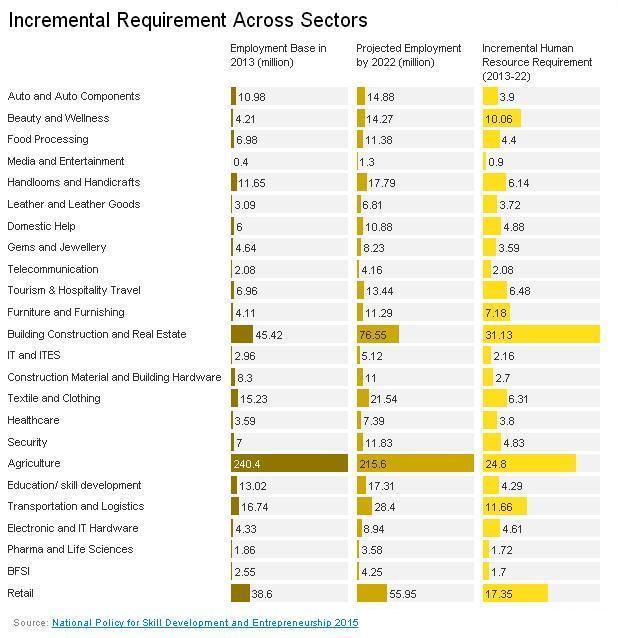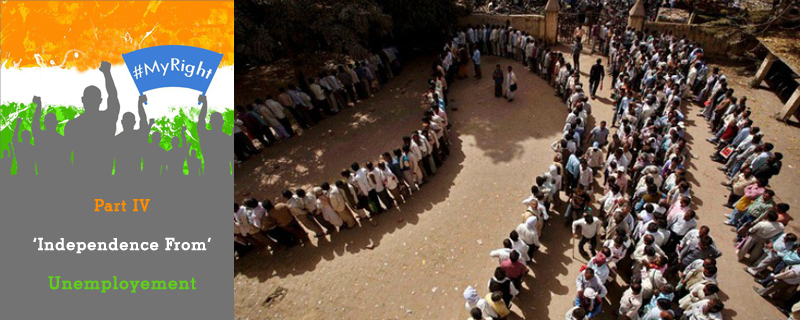India is a highly populated democratic nation. Around 60% of India’s population is young and need their skills to be channelized. They have to earn and contribute to the nation’s development. Creation of new jobs is a crucial task. The education level in recent years has increased and the development of skill is an essential subject matter. Moreover, poverty and limited access to basic education are some of the major factors that lead to unemployment and underemployment. During recession, job layoff is the most common occurrence done by companies. Under such circumstances there is a greater degree of unemployment.
The predominant challenges for key economic policies arise from an unemployed workforce. According to the India Labour and Employment Report 2016, there are around 13 million people in the workforce, available for work, which are at present unemployed, 30% of them women. In addition, there are around 52 million people, 65% of them women, in disguised unemployment. Then there are another 52 million, all women, who are not in the labour force but would be available for work if there were adequate opportunities for productive employment. Thus there are 117 million people, 78% of them women, who need to be absorbed into new and more productive jobs. There are another 6-8 million young people who will be entering the labour force each year for the next decade or so. Creating new employment on this scale is an extraordinary challenge.
Assuming that the government and private sector share a responsibility to effectively manage the job market and broader economy, which means economic mismanagement, is as much a moral concern as a policy failure. Governments also have a moral responsibility to acknowledge the increased prevalence of mental health problems during tough economic times and plan accordingly.
Currently the supplied skilled manpower in India is approximately 3.4 million. According to the International Labour Organization, there will be a demand for 500 million skilled workers in India by 2022. The huge deficit of 496.6 million workers needs to be addressed in just 8 years, making skill an urgent national priority. This manpower underlines India’s growth story and economic advances since liberalisation and is significant at a time when labour force in the industrial world is on the decline. India has the potential to provide skilled manpower to fill the gap across industries. Therefore, the 2013 Companies Act mandate on Corporate Social Responsibility (CSR) provides the opportunity for corporates to generate momentum to innovate and invest in skill development.
According to the Economic Survey of 2014-15, although India is adding 12 million to the job market annually, only 3% of the workforce has undergone skill training of any form. The target of reaching out to a potential workforce and skilling them inorder to enter a lucrative livelihood can result in a significant impact on the economic growth and social stability of the country. In 2014, the central government set-up the country’s first Ministry of Skill Development and Entrepreneurship to create an ecosystem with the key inclusion of ‘Make in India.’
The National Skill Development Corporation (NSDC) in 2014 released a skill gap analysis, which provided an account of an additional requirement of 109.73 million skilled manpower by 2022 across 24 key sectors.

It is estimated that a mere 4.69% of the total workforce in India has undergone formal skill training of any sort compared to 68% in UK, 75% in Germany, 52% in the US, 80% in Japan and 96% in South Korea.
Progressive companies can find ways to leverage their core strengths and widespread presence to create sustainable social impact. Investment in skill development leads to the creation of resource and provides long term business values to the entire ecosystem. The demand can be understood as they set the benchmark and provide relevant expertise. Allotting money under the mandate should only be the beginning. The sharing of values and capacity building can play a key role in scaling up an overall growth and moderately reduce the unemployment figures. This will enhance in placing every Indian citizen at par or more with their global counterpart.
Thank you for reading the story until the very end. We appreciate the time you have given us. In addition, your thoughts and inputs will genuinely make a difference to us. Please do drop in a line and help us do better.
Regards,
The CSR Journal Team


